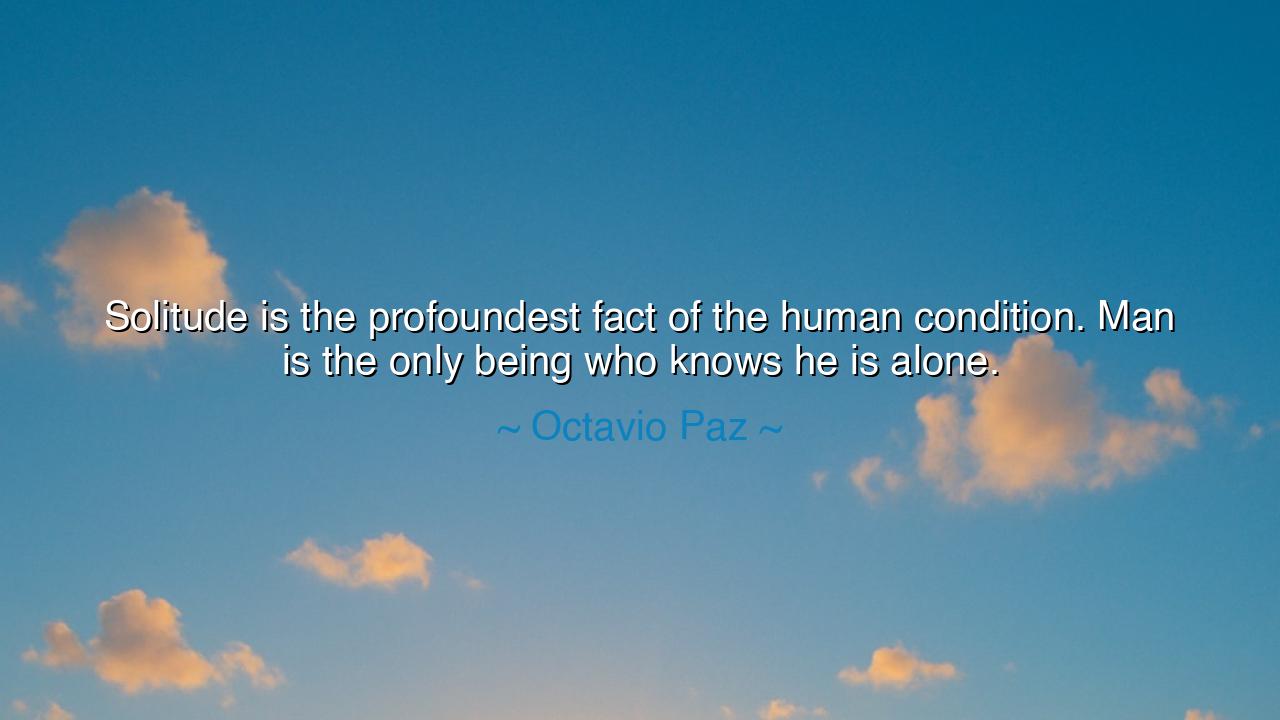
Solitude is the profoundest fact of the human condition. Man is
Solitude is the profoundest fact of the human condition. Man is the only being who knows he is alone.






When Octavio Paz wrote, “Solitude is the profoundest fact of the human condition. Man is the only being who knows he is alone,” he spoke not merely as a poet, but as a philosopher of the soul. His words pierce to the very heart of what it means to be human — to live, to love, and to die with the awareness that beneath all companionship, all laughter, and all longing, there exists an inescapable solitude. For animals act, live, and perish within the flow of nature, unconscious of their isolation. But man, endowed with consciousness, looks into the mirror of existence and realizes he stands apart — not from cruelty, but from awareness. It is this knowledge, Paz tells us, that defines our humanity and gives rise to both our suffering and our creativity.
This is no lament, but a revelation. To know that we are alone is to awaken from the dream of innocence. It is the price of consciousness, the burden of self-awareness. Every man and woman, no matter how surrounded by love or noise, carries within them a secret chamber that no one else can enter — the silent space of the self. Paz calls this the “profoundest fact” because it is universal and unchanging. Kingdoms fall, civilizations rise, and technologies evolve, but the solitude of the human heart remains eternal. It is there, in that inner silence, that each of us must confront the mystery of existence — the questions of who we are, why we are here, and what it means to live and die.
The origin of this quote comes from Paz’s reflections in The Labyrinth of Solitude, his meditation on Mexican identity and the broader condition of modern humanity. He saw that loneliness was not merely a personal ache, but a collective state of being — that societies, like individuals, wear masks to hide their isolation. Beneath progress and culture, he found a deep spiritual exile. Man, he said, had become separated not only from others, but from himself. Yet within this exile lies the seed of awareness: for it is only by facing solitude that one can begin the journey toward understanding and unity. To know you are alone is the first step to knowing you belong to something greater.
We see the truth of Paz’s words echoed across the ages. Buddha, sitting beneath the Bodhi tree, faced his solitude without flinching. Surrounded by silence, he beheld the suffering of all beings and discovered compassion. Jesus, alone in the wilderness, wrestled with temptation and found his divine calling. Nietzsche, in his solitude on the mountains of Sils-Maria, looked into the abyss and saw both despair and possibility. Each of these souls confronted the same truth: that no one can walk the inner path for us. The awakening of spirit is always a solitary act, even when it serves humanity as a whole.
And yet, Paz’s insight carries not despair, but dignity. To know we are alone is not to despair of connection — it is to understand that every true bond, every act of love or empathy, is meaningful precisely because it bridges that loneliness. The mother holding her child, the poet writing to the unseen reader, the stranger offering kindness — all these gestures shine brighter against the vast backdrop of solitude. If we were not alone, we would not need love; if we did not feel separation, we would not seek understanding. Thus, solitude is not a curse, but the womb of human connection.
The wise do not flee from solitude, for they know it is the mirror in which truth is revealed. It is in silence that the artist hears the rhythm of creation, and in stillness that the philosopher grasps the shape of eternity. To escape solitude through distraction or noise is to live half-awake; to accept it is to live deeply. Paz’s words are an invitation to courage — to dwell in one’s own soul, to listen to its questions, and to let that awareness transform loneliness into clarity, compassion, and creation.
So, let this be the lesson: do not fear solitude; make it your teacher. Sit quietly with yourself and learn to see not emptiness, but depth. When you feel alone, remember that you share that solitude with all of humanity — that every thinker, every lover, every seeker has walked that same inner road. Use that awareness not to withdraw from the world, but to meet it more fully, knowing that every act of love, every word of truth, every spark of beauty, is born from the one eternal fact — that man, in his solitude, reaches for meaning, and in reaching, becomes divine.






AAdministratorAdministrator
Welcome, honored guests. Please leave a comment, we will respond soon